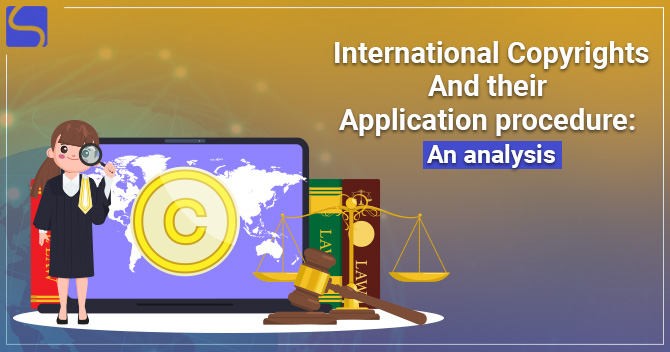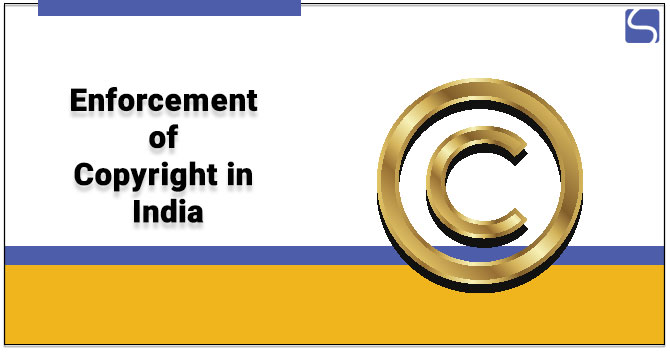International Copyrights and their application procedure: An analysis

Siddharth Verma | Updated: Dec 28, 2021 | Category: Copyright
The copyright law conceptually has the territorial and regional scope of the application process. The protection against the infringement of copyright work is regulated and depends upon the countries’ national laws. However, numerous international copyright treaties and international conventions have simplified the procedure for granting protection to foreign copyright holders. Therefore, the process permitted the creators and content owners from different countries to enjoy exclusive rights over their work worldwide. Scroll down to check more about international copyrights.
Table of Contents
When the Protection of Copyright commence
The basic concept incorporated in the Berne convention is “automatic protection,” which means protection of copyright begins automatically when the work is infringed.
The “work” is defined as:
- Any literary work
- Musical composition
- The film, or a software program
- Any painting
- Or any expression and creative ideas
What are the treaties related to International Copyright?
- Berne Convention is considered the oldest and has significant importance in copyright conventions.
- It was signed in 1886 and was revised various times.
- Almost 180 countries rectified the treaty
- It has established the minimum standard of safeguard against infringement. The minimum standards it offers are types of work protected, duration of protection, the scope of exceptions, Limitations, etc.
Copyright Treaty “WIPO”
- It was signed in 1996
- It highlights and clears that the computer programs and databases are protected by copyright
- The World Trade Organization has administered it
States that national legislation must allow for effective enforcement of IP rights and detail how enforcement should be handled.
Role of Berne Convention for the protection of Literary and artistic works
The Berne convention focuses on the protection of works and the rights of their authors. It has been founded on three fundamental principles and includes various rules specifying the minimum level of protection to be provided and particular safeguards available to poor nations. The Berne Convention mandates automatic protection for all creative works in a fixed medium. This means that copyright protection does not require registration or deposit with a government copyright office. However, there are voluntary government registration systems where copyright owners can register their works to receive certain rights and advantages, particularly in copyright infringement cases.
There are Some Important and basic principles of the Berne Convention in respect of International copyrights:
- National Treatment- Works originating in one of the Contracting States (that is, works whose author is a national of that State or works originally published in that State) must be afforded the protection in each of other Contracting States as the latter accords to its own nationals’ works.
- Automatic Protection- The protection should not be conditional on compliance.
- Independence of Protection- The protection is considered independent of the existence of protection in the country of origin of the work.
Application in respect of international copyrights
Copyright protection is available in many countries across the world because India is a party to the Berne Convention, even if the work was first published in India. Thus, copyright protection is available to works first published in India throughout numerous nations, even if they are not formally applied. In addition, any work that fits under the categories of literature, theatre, music, art, cinematography, or sound recordings is protected by copyright. The work that is being copyrighted must be original, but it does not have to contain an original thought or idea. The law is concerned with the originality of intellectual expression.
Application of Copyright Law in India
Legislation on copyright in India is governed by the Copyright Act of 1957 (the Act), supplemented by the Copyright Rules of 1958. Because India has a common legal system, it takes the help of case laws to interpret and establish legal precedents. Thus judicial decisions add to India’s copyright law sources. The Berne Conventions and the Universal Copyright Convention, are both signed by India. The International Copyright Order, 1999, was also passed by the Indian government. According to this Order, any book originally published in any country that is a member of any of the above conventions obtains the same treatment as if it were first published in India. In India, the copyright registration procedure is governed by the Copyright Act of 1957 and the Copyright Rules of 2013[1]. Copyright can be applied to any unique artistic creation, cinematographic film, musical composition, literary/dramatic work, sound recording, or software that is a concrete manifestation of ideas.
Recommendations in respect of copyright registration:
- The First Schedule to the Rules requires that an application for registration be made on Form IV (Including Statement of Particulars and Statement of Further Particulars).
- Each application must be accompanied by the amount specified in the second schedule, which can be paid by Demand Draft, Indian Postal Order, or E-payment to the “Registrar of Copyright Payable at New Delhi.”
- The application must include all required signatures and powers of attorneys.
- Three copies of the work must accompany the application. A copy of the manuscript should be supplied with the application if the work is unpublished.
- After then, a Diary Number is provided to track the application’s progress, which is subject to a 30-day mandatory waiting time for any objections.
- The application will be forwarded to an examiner if there are no objections. The registration process will be finished if the examiner finds no faults in the application.
Conclusion
We conclude that International copyrights have played a vital role for a long time. The conventions related to copyright infringement protect the artistic creation, cinematographic film, musical composition, literary/dramatic work, sound recording, or software of the original creators. There are various conventions in respect of International copyrights, like Berne, WIPO, GATT, universal copyright convention.
Read our Article:Emerging Copyright Issues in E-Commerce: An Investigation














